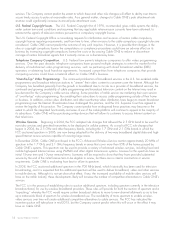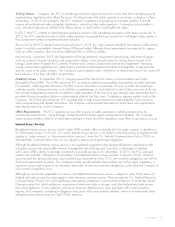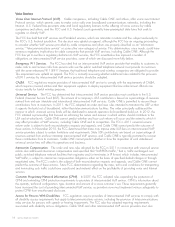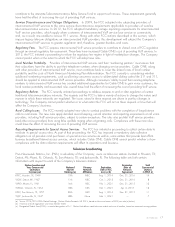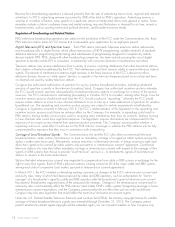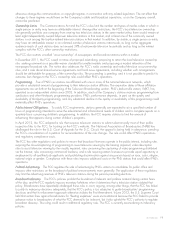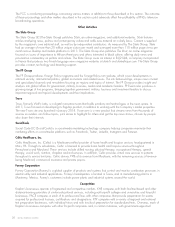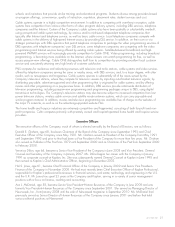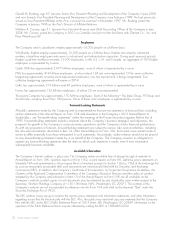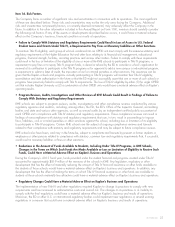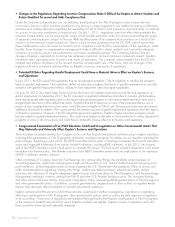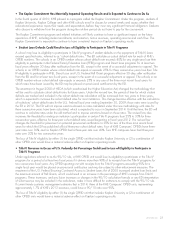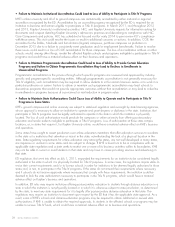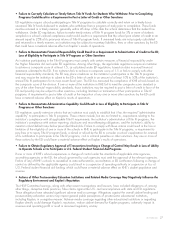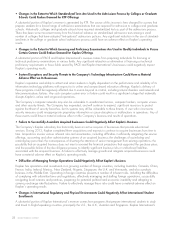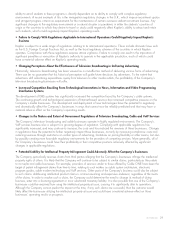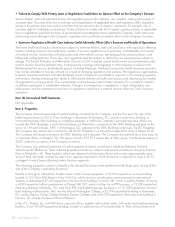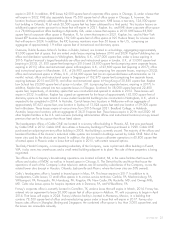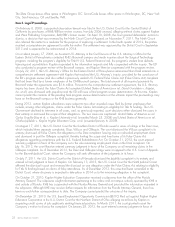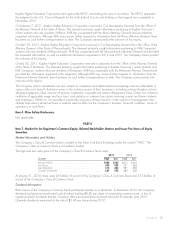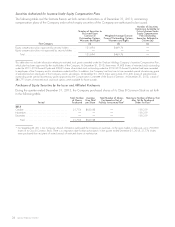Washington Post 2013 Annual Report Download - page 42
Download and view the complete annual report
Please find page 42 of the 2013 Washington Post annual report below. You can navigate through the pages in the report by either clicking on the pages listed below, or by using the keyword search tool below to find specific information within the annual report.• Changes to the Regulations Regarding Incentive Compensation Make It Difficult for Kaplan to Attract Students and
Retain Qualified Personnel and Adds Compliance Risk
Under the incentive compensation rule, an institution participating in the Title IV programs may not provide any
commission, bonus or other incentive payment to any person or entity engaged in any student recruiting or admission
activities or in making decisions regarding the awarding of Title IV funds if such payment is based directly or indirectly
on success in securing enrollments or financial aid. On July 1, 2011, regulations went into effect that amended the
incentive compensation rule by reducing the scope of permissible payments under the rule and expanding the scope
of payments and employees subject to the rule. KHE modified some of its compensation practices as a result of the
revisions to the incentive compensation rule. Due to a lack of clear guidance from the ED, KHE cannot assure that
these modifications will in all cases be found to be in compliance with the ED’s interpretation of the regulations. Addi-
tionally, these changes to compensation arrangements make it difficult to attract students and to provide adequate
incentives to promote superior job performance and retain qualified personnel. The Company believes that this
change in Kaplan’s approach to recruiting has adversely impacted, and will continue to adversely impact, Kaplan’s
enrollment rates, operating costs, business and results of operations. The company cannot predict how the ED will
interpret and enforce all aspects of the revised incentive compensation rule in the future, and any changes in this
regard could have a material adverse effect on Kaplan’s business and results of operations.
• Potential ED Rules Regarding Gainful Employment Could Have a Material Adverse Effect on Kaplan’s Business
and Operations
In June 2011, the ED issued final regulations that tie an education program’s Title IV eligibility to whether the program
leads to gainful employment. The regulations define an education program that leads to gainful employment as one that
complies with gainful employment metrics relating to loan repayment rates of program graduates.
On June 30, 2012, the United States District Court for the District of Columbia overturned most of the final regulations on
gainful employment. In September 2013, the ED convened a negotiated rulemaking committee to consider gainful employ-
ment and proposed draft regulations that would require educational programs to meet certain debt-to-earnings ratios and a
programmatic level loan cohort default rate metric. Programs that fail to meet one or more of the proposed metrics over a
period of time, ranging from two to four years, would become ineligible for Title IV aid. The proposed rules may also require
additional disclosures to students. We cannot predict the ultimate outcome of gainful employment regulations and their impact
on Kaplan’s operations. However, if the ED adopts the proposed regulations, Kaplan’s higher education programs would
become subject to gainful employment metrics. This could cause Kaplan to eliminate or limit enrollments in certain educational
programs at some or all of its schools and could have a materially adverse effect on its business and operations.
• Congressional Examination of For-Profit Education Could Lead to Legislation or Other Governmental Action That
May Materially and Adversely Affect Kaplan’s Business and Operations
There has been increased attention by Congress on the role that for-profit educational institutions play in higher education,
including their participation in Title IV programs and tuition assistance programs for military service members attending for-
profit colleges. Beginning in June 2010, the HELP Committee held a series of hearings to examine the for-profit education
sector and requested information from various for-profit institutions, including KHE institutions. In July 2012, the majority
staff of the HELP Committee issued a final report to conclude the review. The final report included observations and recom-
mendations for federal policy. The ultimate outcome of the HELP Committee review and any implications to the operation
of KHE’s institutions remains unknown.
Other committees of Congress have also held hearings into, among other things, the standards and procedures of
accrediting agencies, credit hours and program length and the portion of U.S. Federal student financial aid going to for-
profit institutions. Several legislators have variously requested the U.S. Government Accountability Office to review and
make recommendations regarding, among other things, student recruitment practices; educational quality; student
outcomes; the sufficiency of integrity safeguards against waste, fraud and abuse in Title IV programs; and the percentage
of proprietary institutions’ revenue coming from Title IV and other U.S. Federal funding sources. This increased activity,
and other current and future activity, may result in legislation, further rulemaking affecting participation in Title IV programs
and other governmental actions. In addition, concerns generated by congressional or other activity, or negative media
reports, may adversely affect enrollment in for-profit educational institutions.
Kaplan cannot predict the extent to which these activities could result in further investigations, legislation or rulemaking
affecting its participation in Title IV programs, other governmental actions and/or actions by state agencies or legislators
or by accreditors. If any laws or regulations are adopted that significantly limit Kaplan’s participation in Title IV programs
or the amount of student financial aid for which Kaplan’s students are eligible, Kaplan’s results of operations and cash
flows would be adversely and materially impacted.
24 GRAHAM HOLDINGS COMPANY


